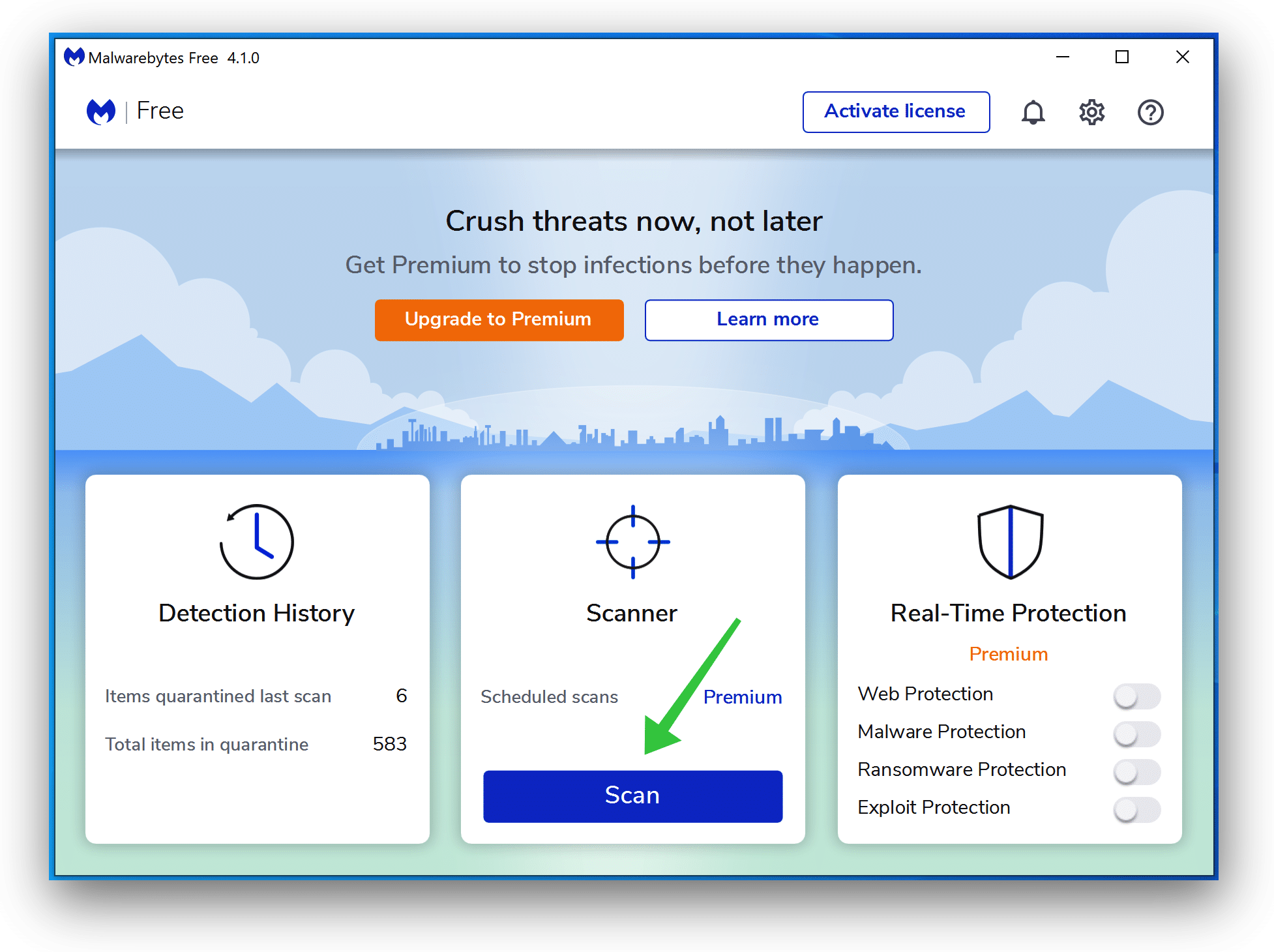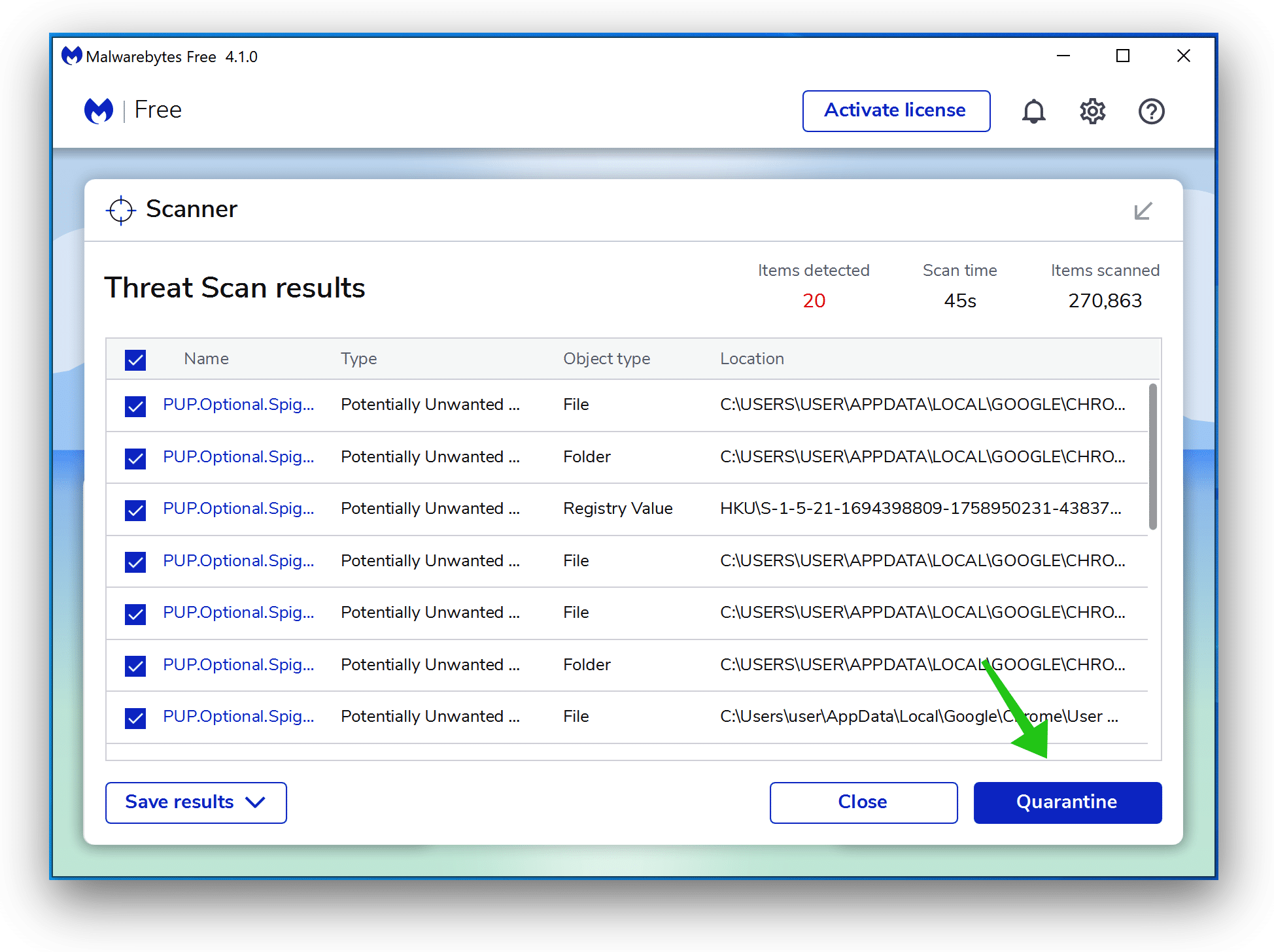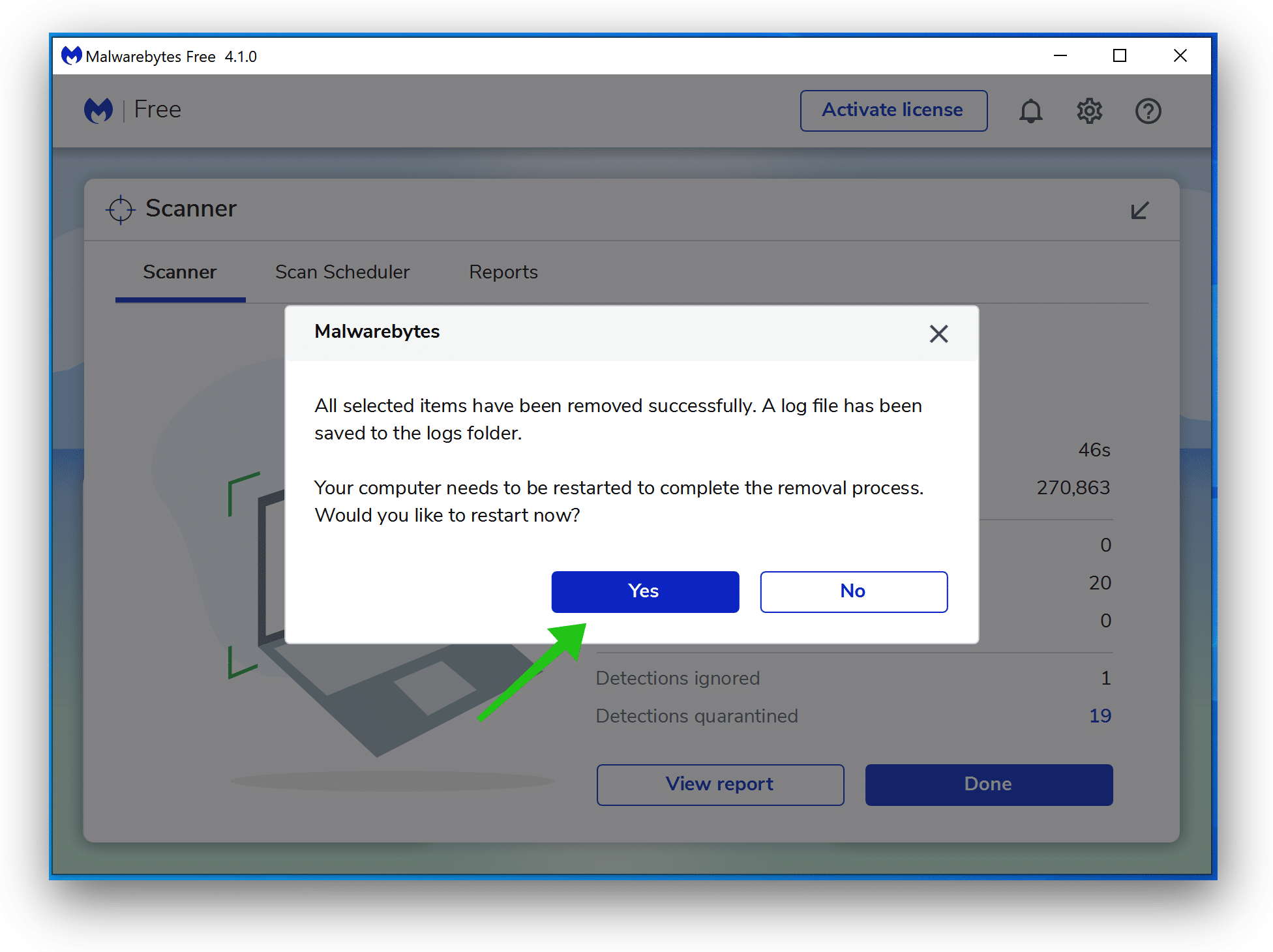Do you see ads from “7 viruses detected” on your computer, phone, or tablet? “7 viruses detected” website is an unwanted website used by ad networks to trick users.
Many advertising networks and other unwanted websites are operating on the Internet. These websites trick you with fake advertisements, unwanted ads, online scams, and other websites that infect might infect your computer with a virus.
Suppose you constantly see the “7 viruses detected” on your device. In that case, your device may be infected with unwanted software, or your browser may have been redirected through a dangerous advertising network.
Clicking on “7 viruses detected” makes money for online spammers on the Internet. This is earned by collecting as many clicks or information about the users as possible. Thus, I do not recommend clicking on the “7 viruses detected” website. If you have no idea why the “7 viruses detected” website is displayed on your device, make sure you check your device with anti-malware software, as advised in this guide.
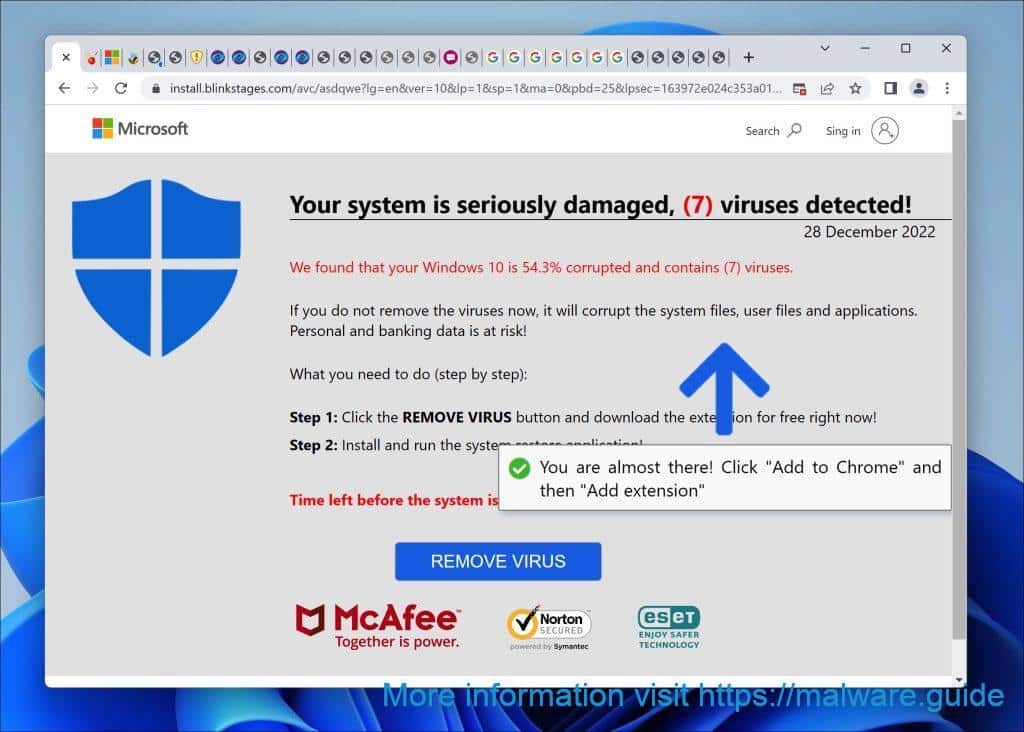
Never act on the information you see on the “7 viruses detected” website. It attempts to trick you by obtaining personal information, tricking you through a fake virus message, or redirecting the browser to potentially other dangerous websites. In addition, if you click on ads promoted by the “7 viruses detected” URL, your computer is at risk, and malware may be installed.
I recommend checking your computer for malware. Scan your computer for unwanted software, malware, and viruses. In addition, I recommend being careful about what websites you visit. Therefore, protect your computer with adguard to prevent ads from “7 viruses detected” in the future.
Remove “7 viruses detected”
Malwarebytes is an essential tool in the fight against malware. Malwarebytes can remove many types of “7 viruses detected” malware that other software often miss. Malwarebytes is costing you absolutely nothing. For cleaning up a virus-infected computer, Malwarebytes has always been free, and I recommend it as an essential tool in the battle against malware.
- Download Malwarebytes
- Install Malwarebytes, and follow the on-screen instructions.
- Click Scan to remove “7 viruses detected”.
- Wait for the Malwarebytes scan to finish.
- Once completed, review the “7 viruses detected” adware detections.
- Click Quarantine to continue.
- Reboot Windows after all the adware detections are moved to quarantine.
Continue to the next step.
Remove unwanted programs with Sophos HitmanPRO
In this second malware removal step, we will start a second scan to ensure no malware remnants are left on your computer. HitmanPRO is a cloud scanner that scans every active file for malicious activity on your computer and sends it to the Sophos cloud for detection. In the Sophos cloud, both Bitdefender antivirus and Kaspersky antivirus scan the file for malicious activities.
- Download HitmanPRO
- When you have downloaded HitmanPRO install the HitmanPro 32-bit or HitmanPRO x64. Downloads are saved to the Downloads folder on your computer.
- Open HitmanPRO to start installation and scan.
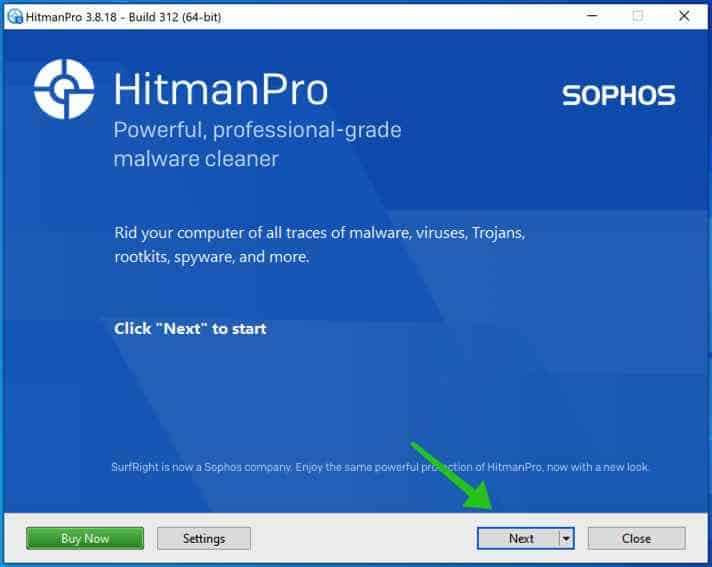
- Accept the Sophos HitmanPRO license agreement to continue.
- Read the license agreement, check the box, and click on Next.
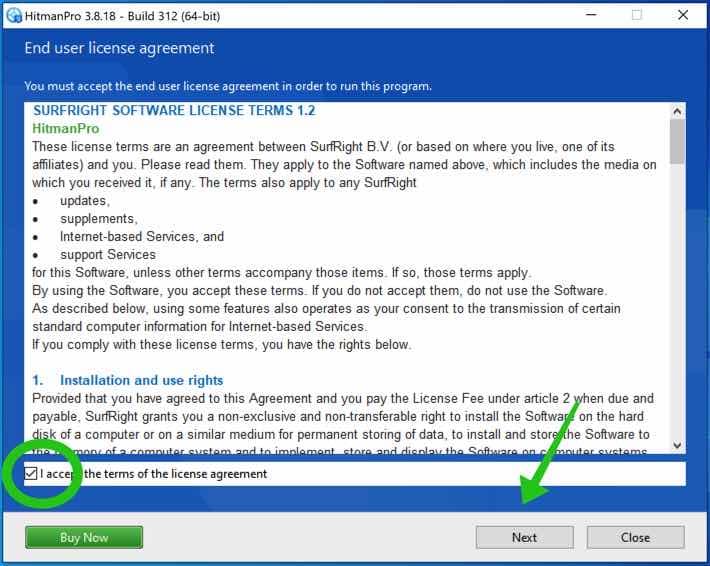
- Click the Next button to continue Sophos HitmanPRO installation.
- Make sure to create a copy of HitmanPRO for regular scans.
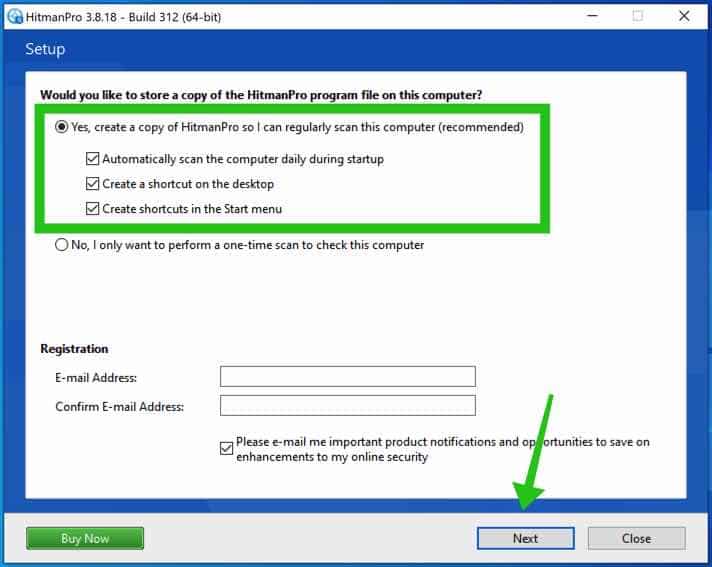
- HitmanPRO begins with a scan; wait for the antivirus scan results.
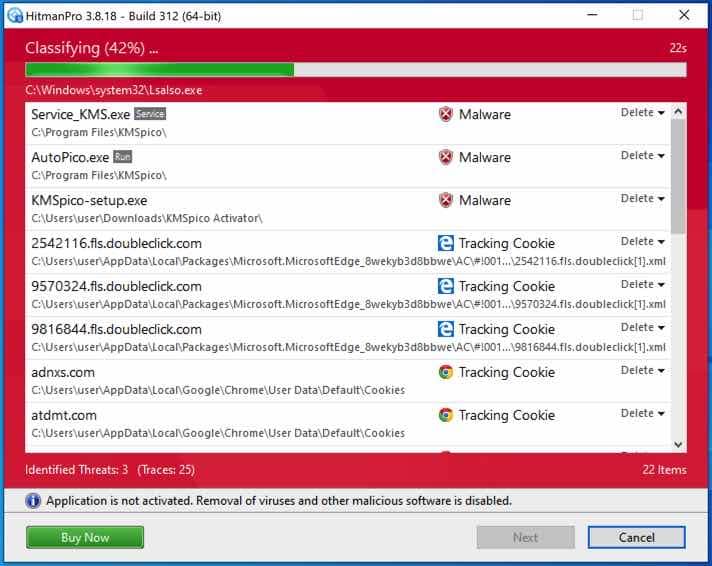
- When the scan is done, click Next and activate the free HitmanPRO license.
- Click on Activate Free license.
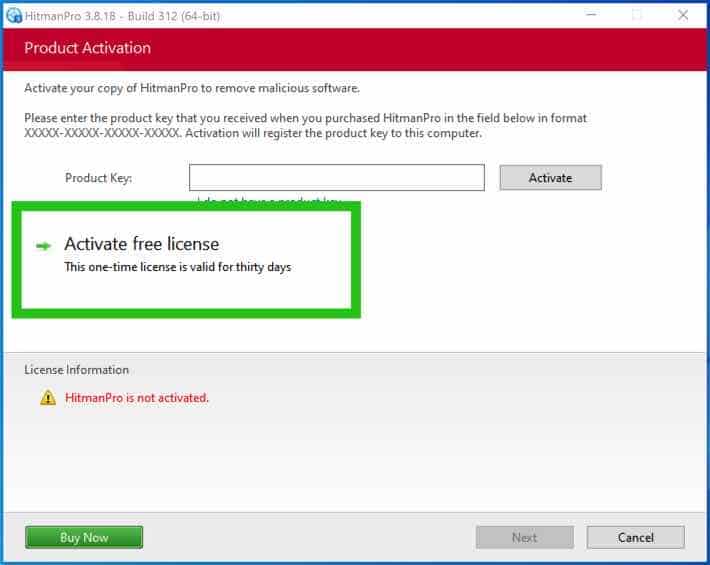
- Enter your e-mail for a Sophos HitmanPRO free thirty days license.
- Click on Activate.
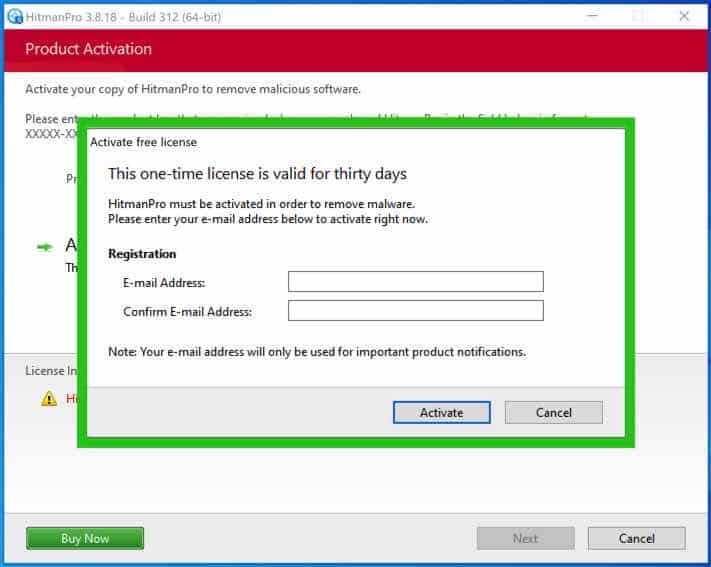
- The free HitmanPRO license is now successfully activated.
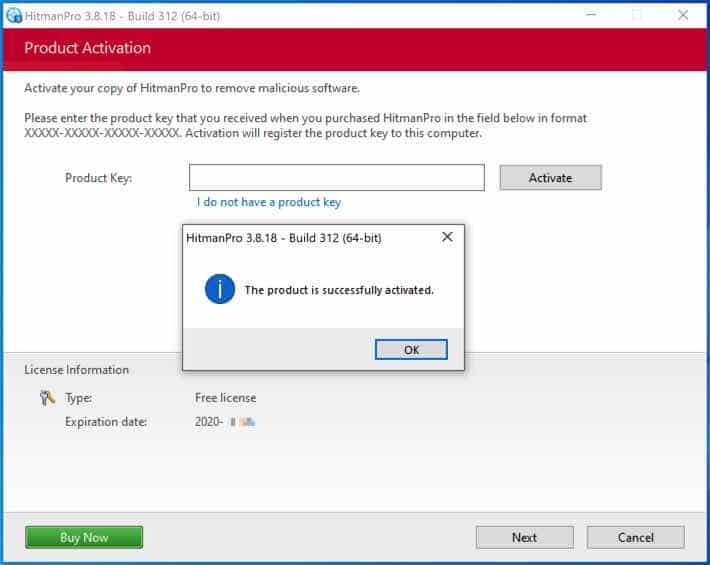
- You’ll be presented with the malware removal results.
- Click Next to continue.
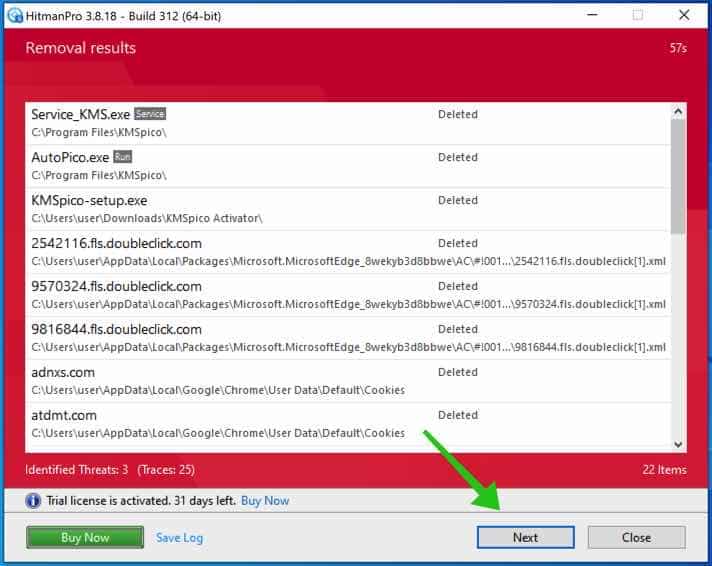
- Malicious software was partially removed from your computer.
- Restart your computer to complete the removal.
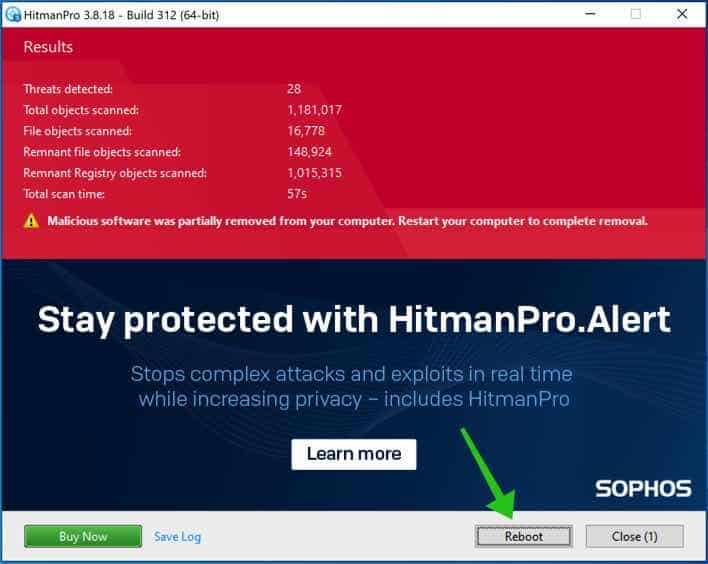
Bookmark this page when you reboot your computer.
Learn more about “7 viruses detected” pop-ups
It’s frustrating when you’re using the internet and bombarded with pop-up ads you don’t want. Whether you’re trying to watch a video, read an article, or check your email, these ads can be annoying and intrusive. You can’t even go online without being bombarded with ads. Fortunately, there are ways to block these unwanted pop-up ads and prevent them from disrupting your online experience. With the right tools and a few simple steps, you can make your online browsing experience much smoother and more enjoyable. Read on to learn more about how to block unwanted pop-up ads.
What are “7 viruses detected” pop-up ads?
Pop-up ads are ads that open in a new browser window while you’re browsing the web. They are incredibly disruptive to your browsing experience and can be very annoying. These ads appear when browsing the web and trying to sell you products or services. Unfortunately, they can be very intrusive, making it difficult to focus on the task. Pop-up ads are often very misleading and can trick you into clicking on them or spending money on products you don’t want. These ads can appear on any site you visit, so if you’re trying to look up a recipe or catch up on current events, you’ll likely be interrupted by one. These ads are often triggered by your browsing history, search history, and previous purchases, so it’s important to take control of your internet browsing experience and block them.
Why you should block “7 viruses detected” pop-up ads
Pop-up ads are annoying, disruptive, misleading, and completely unnecessary. They can trick you into clicking on them, making it difficult to focus on the content you want to see. Additionally, they’re often very inappropriate and may contain inappropriate content. Pop-up ads can also contain malicious code that can infect your computer with viruses or malware. For all these reasons, pop-up ads should be blocked. Blocking pop-up ads will optimize your browsing experience, making online shopping or researching a topic much less frustrating.
Popular tools for blocking unwanted pop-up ads
There are various tools you can use to block pop-up ads. Most pop-up blocker extensions and apps will come with a free trial or a free version, and then you can choose to purchase the premium version if you want more features.
Ad Blocker: This is one of the most popular tools for blocking pop-up ads. Ad Blocker is available for multiple browsers, and it can effectively block a variety of different ads.
Privacy Badger: Privacy Badger is another popular pop-up blocker. This tool works to identify and block any third-party scripts that would typically trigger pop-up ads.
NoScript: NoScript is a pop-up blocker that prevents third-party scripts from loading on certain websites. This tool is useful because it allows you to select which sites you want to block third-party scripts on.
How to block “7 viruses detected” pop-up ads in Chrome
You can use a few different tools to block pop-up ads in Chrome. One of the most popular tools for blocking pop-up ads is Ad Blocker. This extension is free and blocks pop-up ads on all websites. Another tool you can use to block pop-up ads in Chrome is Disconnect. Chrome also has its built-in pop-up blocker, so you can try using it. If you’re using the built-in pop-up blocker, check the “Block pop-ups in other browser windows” box in your Chrome settings.
How to block “7 viruses detected” pop-up ads in Firefox
You can use a few different tools to block pop-up ads in Firefox. You can use Ad Block or NoScript to block all pop-up ads on every website. You can also use Disconnect to block some third-party ads while allowing certain ads, such as those from Amazon. If you’re using Firefox, select the “Blocking pop-up windows” option in your Firefox settings.
How to block “7 viruses detected” pop-up ads in Safari
Safari has a built-in pop-up blocker, so you can use it to block most pop-up ads. You can also use a third-party pop-up blocker like Ad Blocker to enhance your browsing experience further and block more ads. Make sure you select the “Block pop-up windows” option in your Safari settings to ensure that pop-ups are blocked.
How to block pop-up ads in Internet Explorer
You can block pop-up ads in Internet Explorer using various tools. You can use a pop-up blocker extension or app to block all pop-up ads while browsing the web. Internet Explorer also has its own built-in pop-up blocker, so you can also use that to block pop-up ads. Make sure you select the “Pop-up Blocker” option in your Internet Explorer settings to turn the pop-up blocker on.
How to block “7 viruses detected” pop-up ads on an Android device
You can block pop-up ads on your Android device by downloading an ad blocker app. Various ad blocker apps are available for Android, so you can choose whichever one you prefer. After you’ve downloaded the ad blocker app, make sure you turn it on. Some ad blocker apps have a toggle switch in the app’s settings menu that you must turn on.
How to block “7 viruses detected” pop-up ads on an Apple device
You can block pop-up ads on your Apple device by downloading an ad blocker app. There are various ad blocker apps available for Apple devices, so you can choose whichever one you prefer. After you’ve downloaded the ad blocker app, make sure you turn it on. Some ad blocker apps have a toggle switch in the app’s settings menu that you must turn on.
How to block “7 viruses detected” pop-up ads on a Windows device
You can block pop-up ads on your Windows device by downloading an ad blocker app. Various ad blocker apps are available for Windows devices, so you can choose whichever one you prefer. I recommend Malwarebytes. After you’ve downloaded the ad blocker app, make sure you turn it on. Some ad blocker apps have a toggle switch in the app’s settings menu that you must turn on.
Pop-up ads are incredibly disruptive and annoying. Fortunately, you can use various tools to block these unwanted pop-up ads and prevent them from disrupting your online experience. Make sure you use the recommended tools to block pop-up ads and improve your online browsing experience.
Remember: “7 viruses detected” ads are usually a sign of adware on your computer. Learn more about adware:
Adware is a type of malware designed to generate revenue through advertisements. It is often installed unknowingly, alongside the software and applications you download, and can significantly impede your online experience. Adware is typically difficult to detect and can be found on desktop and mobile devices, making it a significant threat to your digital security. Adware can be intrusive and bothersome, often displaying unwanted pop-up ads, redirecting webpages, and slowing down your device’s performance. It can also collect your data and track your online activity. To protect yourself from adware, it’s important to understand how it works and how to detect it.
Adware is a type of software that delivers “7 viruses detected” advertisements through your device. It is often installed unknowingly, alongside the software and applications you download, and can significantly impede your online experience. Adware is typically difficult to detect and can be found on desktop and mobile devices, making it a significant threat to your digital security.
Adware has several different forms, including web browser extensions, plug-ins, and toolbars; system processes that run in the background; and software that modifies your homepage, search engine, or default browser settings. Adware typically generates revenue for its creators by displaying advertisements on your device, which can be bothersome and intrusive.
Adware works by placing an ad on your device whenever it can find an opportunity to do so without being detected. Adware can be installed on a device when a user clicks on unknown links or downloads an infected file. Once installed on your device, the adware can hijack your browser, search engine, homepage, and default apps. Adware often generates revenue for its creators by displaying advertisements on your device, which can be bothersome and intrusive.
Adware can be difficult to detect, as it can be installed into hidden folders on your device. Once installed, the adware can display ads on your device anytime, even when you’re not browsing the internet. Adware can also collect your data and track your online activity.
Preventing adware is challenging, as it can be difficult to detect and come from various sources. To protect yourself from adware, it’s important to be aware of the dangers of downloading unknown applications, clicking on secure links, and being cautious when using public Wi-Fi connections.
One of the best ways to protect yourself from adware is to keep your device and other applications up to date. Many devices have built-in functionality that automatically detects and installs new updates as they become available, so you’ll always have the most up-to-date version.
You can also use an adware protection tool to scan your device for adware and other malicious software. Many different types of adware protection tools are available, such as antivirus software, a browser extension, or an adware removal tool such as Malwarebytes, as advised in this guide.
Does adware harm my computer? Yes, although adware can cause harm in a variety of ways. Adware can significantly slow down your computer’s performance, as it often generates excessive internet traffic. Adware can also collect your data and track your online activity. Additionally, the adware can generate revenue for its creators, often leading to other malicious activities, such as distributed denial of service (DDOS) attacks.
Adware is a significant threat to your digital security. Adware can be used to collect your data, track your online activity, and generate revenue for its creators. Adware can also be used to distribute malware and hijack your computer. To protect yourself from the dangers of adware, it’s important to be aware of the signs of adware and how to detect it. You should also keep your devices updated with the latest software and use adware protection tools to protect your devices from malicious software. Protect yourself from the dangers of adware by keeping your devices up to date with the latest software and using adware protection tools to protect your devices from malicious software.
I hope this information helps. Thank you for reading.
